- Home
- Neal Asher
Gridlinked Page 8
Gridlinked Read online
Page 8
‘Anything more would be expensive, and difficult to bring here,’ said Stanton.
‘I don’t want them here. Where’s our usual supplier?’
‘Huma—and he’s one of many there.’
‘Very well, that’s where we go. Contact Dusache, Menneken, Corlackis and Svent, and have them meet us there. Promise them double the usual. We also get Mr. Crane because, unless I miss my bet, friend Ian Cormac is going to have Golem backup.’
Yeah, thought Stanton, the point where he moved on was arriving. Maybe a million shillings was not enough.
‘Where is Mr. Crane?’ he asked.
‘At the residence. He’s hidden there.’
Stanton shook his head. ‘Risky. Local police will be all over the place by now. You know that. ECS will realize we’ll be on the lookout for another plant, like Cormac, and they won’t bother. There’s also no advantage to them to let us continue operating. They’ll hand all their evidence over to the locals and there’ll be warrants out for everyone in your cell.’
Pelter pressed his hand to his augmentation and appeared confused for a moment. As that confusion passed, he pulled his hand away and clenched it into a fist.
‘Which is why we need Mr. Crane. We have to tidy up here first. There are three people who know just a little too much about off-planet operations. They get picked up and the entire cause will be in trouble. So I can’t allow them to be picked up,’ he said.
Stanton kept his mouth shut. On the one hand, Pelter wanted to go after Cormac, which was a dubious operation at best. Yes, it would mean getting rid of a dangerous enemy to the Separatist cause, but, in reality, their resources would be better spent elsewhere. His real reason was plain vengeance. On the other hand, Pelter was considering a ruthless action for the Separatist cause, an action that, although preventing other operations being discovered, would certainly make him—or the cause—no friends.
Pelter stood. ‘We do it now. We get Mr. Crane,’ he said.
‘As you say, Arian.’
Stanton stood up as well, telling himself to focus on the main issue here: a million New Carth shillings. After he had obtained that payment, he could retire and leave this lunatic to his self-destruction.
* * *
‘Why are you leaving it now?’ Melassan asked as she banged away at her touch-console, before sealing the testimony and transmitting copies down to Cheyne III.
‘I’ve been called in—something else ECS wants me to deal with,’ Cormac replied.
‘That Samarkand thing?’
‘Yes, that is somewhat more serious.’
‘What I don’t understand,’ said Melassan, turning from her console, ‘is why you were called in here at all. Surely a cell like this is beneath your notice?’
Cormac grimaced and wondered if he would have noticed that same edge of sarcasm a few hours ago. ‘It’s about the hardware,’ he said. ‘In that one year with them I’ve seen them using pulse-guns easily as effective as anything ECS possesses, some very high-quality planar explosives, and more recently a proton gun. I also heard rumours of an android, maybe a Golem, broken to psychotic, and used for select hits. I’d like very much to know where they got hold of such a monster, if it really exists.’
‘If it exists,’ Melassan repeated.
‘There is always a chance that it does, and such a chance cannot be ignored. Can you imagine the mayhem such a creature could do with the right programming?’
‘You tell me. You’re the expert.’
Cormac let that go and replied, ‘Assassination, anywhere. With an android like that you have a weapon you can take through any runcible because it would not be recognized as a weapon. Such an android might, just might, get through quite sophisticated defences, even those round one of the big AIs, maybe a runcible AI or a planetary governor and, once there, take control . . . Just imagine a psycho in control of a planetary defence grid.’
‘That bad?’
‘Possibly that bad. The kind of possibility we cannot allow.’
‘It’s probably not true. Probably just propaganda.’
‘Yes, let us hope so.’
5
Money: People need a form of currency that is not just registered somewhere in a silicon brain. Human corporations like Cybercorp, System Metals and JMCC tried, in the early centuries of the millennium, to ban cash money, but they failed. The resultant black economies in the end produced an entirely new currency. The New Yen we know today was that currency, though it can hardly be described as ‘new’ anymore. Since its inception it has had many contenders. The greatest of these is the comparatively recent ‘New Carth Shilling’. It is the case that so long as there are things of value to be exchanged, there will be money. Without it someone, at some point, will write an IOU, and in reality that’s how it all started.
From How It Is by Gordon
The Pelter residence was large, and set in its own grounds outside the city. In Stanton’s experience it was always the wealthy ones who bemoaned Polity takeover, because it prevented them getting even wealthier at other people’s expense. The residence itself had something of the appearance of a Roman villa, but with decorations somewhat more baroque. It was surrounded by orchards of self-pruning pig-apple trees. The trees produced apples the size of human heads. They were never picked and at certain times of the year, effectively the twin summers experienced on Cheyne III, the orchards often swarmed with fruit wasps and small blade beetles. This was now one of those times, but the worrying swarms were not in the orchards. The swarms that there were, which they saw during a fly-by, were around the residence itself, and were of a distinctly uniformed variety.
‘They may have found him by now,’ Stanton observed, secretly hoping that was true.
‘They are searching the house and I have no doubt they will find a lot that is of interest, but they will not find Mr. Crane there,’ Pelter replied. ‘Anyway, they have not yet come anywhere near him. He would have heard them.’
That was it. Stanton gazed at Pelter and understood now what the aug, control unit and optic link were all about. Great: a human lunatic linked to an artificial one. Pelter had his own personal gridlink.
‘Can’t you just tell him to come out to us?’ he asked.
Pelter twisted his face into what might be described as a smile. ‘So you understand, John?’
‘Let’s say, I know what you’re doing . . . Right, where do you want me to bring us down?’
Pelter pointed out beyond the orchards. ‘Bring us down in Tenel’s orchard. We’ll walk in for Crane, then maybe go and visit Tenel afterwards, if he’s in.’
‘They’ll have him by now,’ Stanton said.
‘Not for long,’ Pelter replied. ‘Not for very long at all.’
With an almost vicious twist of the joystick Stanton brought their latest stolen AGC down low, and without lights. He landed it between the rows of plum and cherry trees that Tenel favoured on his property. Stanton waited a moment for his vision enhancement to kick in before he climbed from the vehicle. It surprised him how well Pelter coped in the dark, despite having only one eye. Then again, perhaps Sylac had made some other alterations he did not know about. As he followed the Separatist leader down between the rows of trees, he wondered if even Pelter knew what those alterations were.
In minutes they came to a broken-down chainlink fence. In the pig-apple trees beyond this, blade beetles were rattling their razor wing-cases. The sound made Stanton’s arm itch even more than it already did. At least the wasps were somnolent at night.
‘If one of them hits you, be very certain you do not yell out,’ Pelter said.
Stanton remembered the last time such a beetle had hit him in the face. He had required the services of a cell-welder then, too. He folded up his collar as high as he could and ducked his head into it. These insects could kill people, not deliberately, but with the accidental brush of a wing across a vein when medical help was far away. In some areas a kind of armour had to be worn for fruit picking.
‘No further,’ muttered Pelter, and pointed ahead.
A few metres ahead of them stood the statue of a bearded gentleman clad in impact armour and holding some weapon horizontally across his stomach.
‘My grandfather. He served in the Prador war,’ he explained.
‘Here?’ asked Stanton.
‘Earth, I think. He left here a century ago.’
So saying, Pelter turned back towards the statue and pressed one hand to the side of his head. It was obvious that he was new to using augs and internal control mechanisms. Stanton shook his head and thought he might tell him about it—sometime.
Somewhere an engine started, and with a low grating noise the statue slid to one side. Exposed now was a square entrance and steps leading down. Pelter gestured and Stanton followed him below. It was dark, even for enhanced vision, especially when the statue slid back into place. Once it had stopped sliding, a greenish light flickered on. They were in what appeared to be a small wine cellar bounded by three walls racked with wine bottles and one wall of stone inset with an armoured door.
‘I didn’t answer your question about getting him to come out to us,’ said Pelter.
‘Are you going to answer it now?’ Stanton asked.
‘Yes.’ Pelter walked to one wall of wine bottles. He studied it for a moment, then stepped aside as a vertical section, four bottles wide, slid out. In a moment a set of shelves was revealed. From one shelf he removed two slim square cases. He ignored the various weapons and makings of explosive devices that occupied the other shelves, and held up just the pair of cases.
‘We had to come here for our new identities,’ he explained.
He lowered the cases and nodded towards the armoured door. This action initiated four loud thumps as locks disengaged. The door opened silently. Stanton thought it would be more appropriate for the door to creak.
‘Even Crane would have a problem with that door,’ Pelter commented.
Stanton looked inside the room beyond and wondered just how true that statement was.
* * *
They called him Crane because he was so very tall. They called him Mr. Crane because he was so very prone to dismembering people. However, even politeness did not work. Mr. Crane would kill people as ordered by the holder of his control module, though occasionally he killed people for reasons that were inscrutably his own. John Stanton stared at him and felt the urge to just turn and go. Mr. Crane was two and a half metres tall, so appeared slightly ridiculous sitting in a normal-sized camp chair. He was also utterly still. Over his attenuated frame he wore a coat that stretched right down to his much-patched, beloved lace-up boots. A hat with a wide droopy brim hid his features. Stanton noticed there was mould on the brim of that hat, just as there was on Mr. Crane’s overcoat. Not surprising, as it was damp down here.
‘How long’s he been here?’ he whispered.
‘Two years,’ Pelter replied, and his hand moved up to the metal on the side of his head. This gesture now confirmed for Stanton the antecedents of the module Pelter had caused Sylac to implant in his skull.
‘It was that hit out on the island, wasn’t it? You sent him there to kill one man . . . and how many was it he killed in the end?’ he asked.
Pelter said, ‘Don’t push it, John. You’re a lot more dispensable than he is.’
Stanton bit off any more comments and just watched them. What were they saying to each other, he wondered. What did their little electrical conversation entail?
‘Come on, Crane. Time to wake up,’ Pelter said, aloud.
Mr. Crane stood up in one abrupt movement. Stanton took in the black glitter of eyes now open below the brim of the hat. Crane’s head turned toward Pelter, and he took one long pace forward. Pelter stepped back, his hand pressing harder against the side of his head, and an expression of intense concentration on his face. Crane did not move further; instead he reached up and removed his hat to expose a totally bald head, a thin-featured face and those completely black eyes.
‘That’s better,’ said Pelter.
Stanton reflected how Crane’s artificial skin looked just that: artificial. It had been previously suggested that his skin should be changed, but no one ever wanted to get that close. Stanton supposed the skin must serve the purpose of preventing blood getting into Mr. Crane’s workings. He made sure he kept well out of reach as Crane emerged from his prison. Pelter lowered his hand, then turned for the stairs. Crane walked just a pace behind him, taking dainty little steps to hold the same position. Stanton picked up the two cases, followed, and wished he were somewhere else.
* * *
Cormac glanced up through the transparent roof, then back at the mirrored containment sphere. It seemed that there was a hand closing tighter in his chest for every moment he went without linking in. Maybe he had made the wrong move? Maybe it would be better to have stayed linked and got out of ECS? Immediately upon thinking these questions, which since leaving the shuttle he had been asking himself with greater regularity, he felt an angry self-contempt.
ECS had been Cormac’s life for so very long, and he truly believed in what he was doing. He looked ahead at the short queues before the various embarkation gates. There was an example of what he had been defending: those queues never became very long. There were no papers to be handed over, no passports, and no lengthy custom’s bureaucracy to bypass. Polity citizens travelled in absolute freedom from world to world. The only restriction was on proscribed weaponry, and even that did not prevent travel. If said weaponry was registered and deactivated, you could take it along with you. Even if you did not register it, you could still travel, only the weapon would be dust at your destination; disintegrated by the autoproscription device the runcibles had inbuilt. To travel distances once inconceivable, all you had to do was book your place and pay a fee, register your identity with the runcible AI when you arrived at the sphere, and walk on through. So bloody damned simple. These people here with their daft cosmetic alterations and possibly brain-scrambling augs, they just had no idea, no idea at all.
Cormac stared down at his hands, unclenched them and flexed his fingers. OK—it was going to be OK.
I will remain calm.
He began walking again before people started to wonder why he was standing still in the middle of the embarkation lounge staring up at the sphere. All he needed now was some Samaritan to come up to him and tell him not to be frightened of it. He smiled tightly to himself as he walked along, then, before he reached the row of gates, he turned towards one of the wide and ornately cast synthestone pillars that ostensibly supported the chainglass roof. At one of the four consoles, in the base of the pillar, he halted and slapped his hand down on the reader. He blinked on a momentary flash of red as the reader scanned his retinal pattern.
‘Identity confirmed, Ian Cormac,’ spoke an androgynous voice.
‘I want passage to Minostra as soon as possible,’ he said, then he turned his head slightly as all sounds beyond him suddenly cut out. A privacy field that he had not requested had developed. Now a completely different voice, but one he recognized, spoke from the console.
‘Would that be executive class or second?’ the Cheyne III runcible AI asked him.
Cormac frowned, but felt a kind of joy. This perhaps was the nearest he could come to linking. This privacy, this difference.
‘I think there is nothing worse than a runcible AI—an intelligence responsible for the lives of thousands every day—that likes to make jokes,’ he growled.
‘Then let us move on to something without humour. Arian Pelter has disappeared. Before doing this, he managed to withdraw Separatist funds as well as his personal fortune in cash. He was also seen visiting Sylac, whom I believe you know. Other events may also be connected. A turbine-powered catamaran was driven into
the old lading docks and caused extreme damage. I only mention this because of the rumour that it contained a headless woman.’
‘That may have some relevance,’ Cormac conceded, immediately shutting down on an emotion he did not want to identify. ‘Pelter was always one for melodramatic gestures. Combine something like a Viking funeral with a Separatist blow against the industry the Polity condescends to allow . . . Is that all?’
‘I have no more information to pass on to you at present.’
‘Will you pass on anymore?’
‘If instructed.’
‘Who instructed you this time?’
‘Horace Blegg . . . Now, if you go to Gate C, your departure time will be in ten minutes.’
‘Thank you.’
‘Good luck, Ian Cormac.’
Cormac was about to ask if he needed it, when the privacy field suddenly shut off. He turned away and headed for Gate C. As he walked, he pulled up his sleeve and punched in the deactivation sequence on his shuriken holster. Within minutes of leaving the Minostra containment sphere, he would be able to reactivate it. The main reason for the proscription was to prevent a person carrying an active weapon within the sphere itself. All weapons on the proscribed list were of the types capable of being used to damage a runcible; an occurrence that could easily lead to another Samarkand.
* * *
First Constable Abram spoke quietly and calmly into his mike as he watched the house through his favoured pair of antique binoculars. It was a small place by the standards of the area: one of those Tundra chalet replicas that had been all the rage half a century back. The roof was red-tiled over a construction of synthetic wood painted a quaint pale blue, which appeared silver in the light of Cereb, and there was a rocking chair on the veranda. Appearances could be deceptive: this did not seem the residence of an archcriminal. He lowered the viewer and sighed. He would have preferred to bathe the place in searchlights, but blade beetles were rattling in the trees behind him and they would be attracted to the light. Already four of his men had been sent back for cell-welding after that fiasco at the Pelter residence. The men he had with him now had intensifier augs, so didn’t need much in the way of light to operate. But things could still be missed.

 The Bosch: A Novella (Polity Universe)
The Bosch: A Novella (Polity Universe)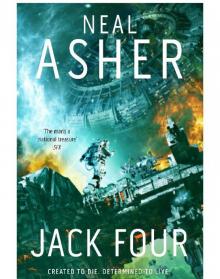 Jack Four
Jack Four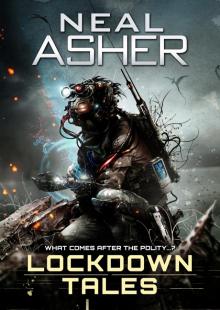 Lockdown Tales
Lockdown Tales The Warship
The Warship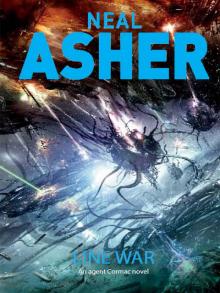 Line War
Line War Total Conflict
Total Conflict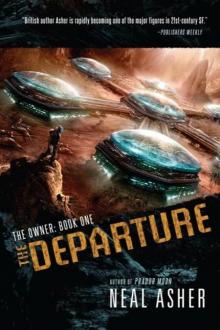 The Departure
The Departure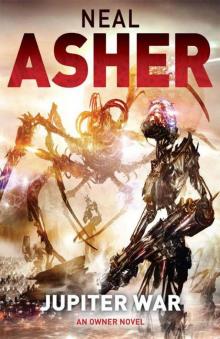 Owner 03 - Jupiter War
Owner 03 - Jupiter War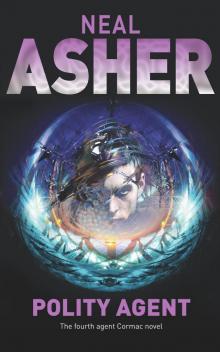 Polity Agent
Polity Agent Prador Moon
Prador Moon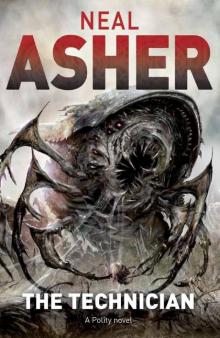 The Technician
The Technician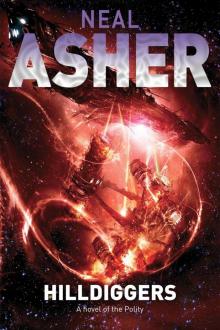 Hilldiggers
Hilldiggers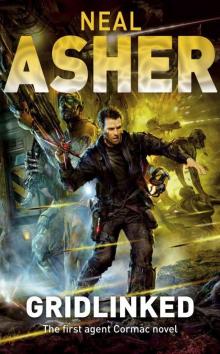 Gridlinked
Gridlinked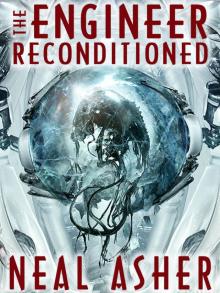 The Engineer ReConditioned
The Engineer ReConditioned Dark Intelligence
Dark Intelligence The Soldier: Rise of the Jain, Book One
The Soldier: Rise of the Jain, Book One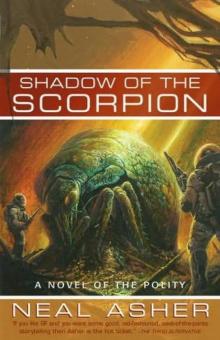 Shadow of the Scorpion p-2
Shadow of the Scorpion p-2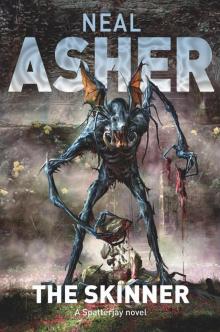 The Skinner
The Skinner The Soldier
The Soldier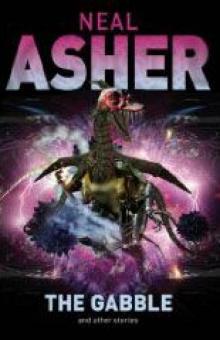 The Gabble p-13
The Gabble p-13 The Gabble and Other Stories
The Gabble and Other Stories The Parasite
The Parasite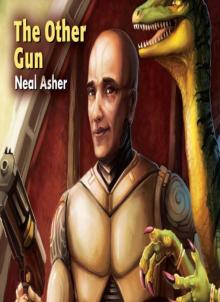 The Other Gun
The Other Gun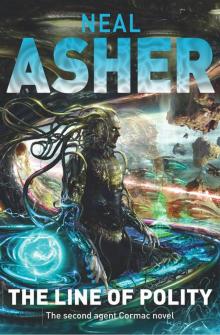 The Line of Polity
The Line of Polity Zero Point (Owner Trilogy 2)
Zero Point (Owner Trilogy 2)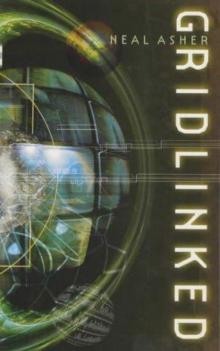 Gridlinked ac-1
Gridlinked ac-1 Prador Moon p-1
Prador Moon p-1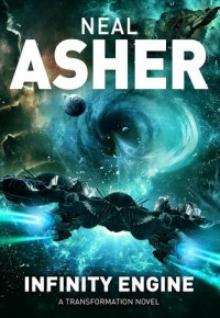 Infinity Engine
Infinity Engine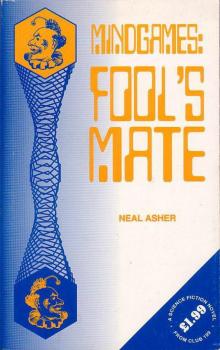 Mindgames: Fool's Mate
Mindgames: Fool's Mate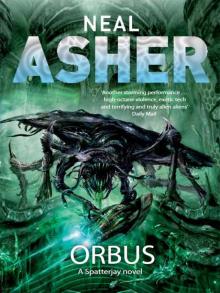 Orbus
Orbus Africa Zero
Africa Zero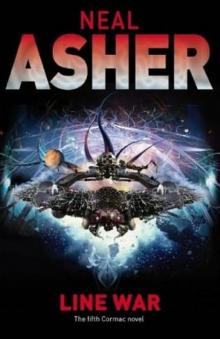 Line War ac-5
Line War ac-5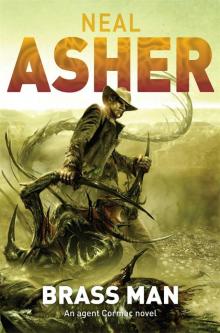 Brass Man
Brass Man The Departure to-1
The Departure to-1 Cowl
Cowl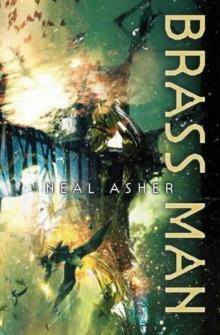 Brass Man ac-3
Brass Man ac-3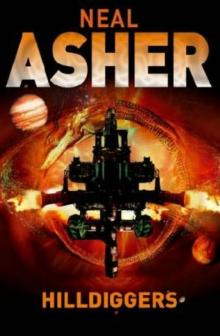 Hilldiggers (polity)
Hilldiggers (polity)![Greg Bear - [Eon Trilogy 1] - Eon (rescan) (v1.0) Read online](http://i1.bookreadfree.com/i2/04/08/greg_bear_-_eon_trilogy_1_-_eon_rescan_v1_0_preview.jpg) Greg Bear - [Eon Trilogy 1] - Eon (rescan) (v1.0)
Greg Bear - [Eon Trilogy 1] - Eon (rescan) (v1.0) The Skinner s-1
The Skinner s-1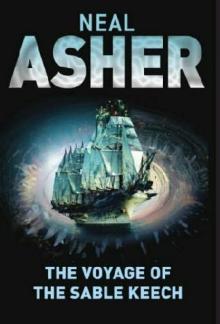 The Voyage of the Sable Keech s-2
The Voyage of the Sable Keech s-2 The Line of Polity ac-2
The Line of Polity ac-2 War Factory: Transformations Book Two
War Factory: Transformations Book Two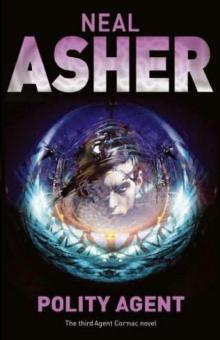 Polity Agent ac-4
Polity Agent ac-4